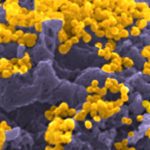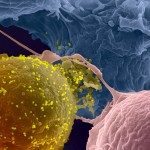Lien vers Pubmed [PMID] – 34237773
Lien DOI – 10.1038/s41586-021-03777-9
Nature 2021 Aug; 596(7871): 276-280
The SARS-CoV-2 B.1.617 lineage was identified in October 2020 in India1-5. Since then, it has become dominant in some regions of India and in the UK, and has spread to many other countries6. The lineage includes three main subtypes (B1.617.1, B.1.617.2 and B.1.617.3), which contain diverse mutations in the N-terminal domain (NTD) and the receptor-binding domain (RBD) of the SARS-CoV-2 spike protein that may increase the immune evasion potential of these variants. B.1.617.2-also termed the Delta variant-is believed to spread faster than other variants. Here we isolated an infectious strain of the Delta variant from an individual with COVID-19 who had returned to France from India. We examined the sensitivity of this strain to monoclonal antibodies and to antibodies present in sera from individuals who had recovered from COVID-19 (hereafter referred to as convalescent individuals) or who had received a COVID-19 vaccine, and then compared this strain with other strains of SARS-CoV-2. The Delta variant was resistant to neutralization by some anti-NTD and anti-RBD monoclonal antibodies, including bamlanivimab, and these antibodies showed impaired binding to the spike protein. Sera collected from convalescent individuals up to 12 months after the onset of symptoms were fourfold less potent against the Delta variant relative to the Alpha variant (B.1.1.7). Sera from individuals who had received one dose of the Pfizer or the AstraZeneca vaccine had a barely discernible inhibitory effect on the Delta variant. Administration of two doses of the vaccine generated a neutralizing response in 95% of individuals, with titres three- to fivefold lower against the Delta variant than against the Alpha variant. Thus, the spread of the Delta variant is associated with an escape from antibodies that target non-RBD and RBD epitopes of the spike protein.















